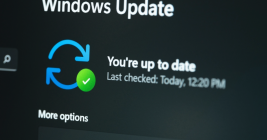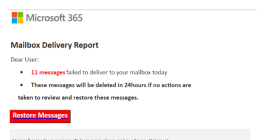Tag Archives: microsoft
Microsoft Patch Tuesday, August 2023 Edition
Teach a Man to Phish and He’s Set for Life
One frustrating aspect of email phishing is the frequency with which scammers fall back on tried-and-true methods that really have no business working these days. Like attaching a phishing email to a traditional, clean email message, or leveraging link redirects on LinkedIn, or abusing an encoding method that makes it easy to disguise booby-trapped Microsoft Windows files as relatively harmless documents.
3CX Breach Was a Double Supply Chain Compromise
We learned some remarkable new details this week about the recent supply-chain attack on VoIP software provider 3CX, a complex, lengthy intrusion that has the makings of a cyberpunk spy novel: North Korean hackers using legions of fake executive accounts on LinkedIn to lure people into opening malware disguised as a job offer; malware targeting Mac and Linux users working at defense and cryptocurrency firms; and software supply-chain attacks nested within earlier supply chain attacks.
Patch Tuesday, November 2022 Election Edition
Let’s face it: Having “2022 election” in the headline above is probably the only reason anyone might read this story today. Still, while most of us here in the United States are anxiously awaiting the results of how well we’ve patched our Democracy, it seems fitting that Microsoft Corp. today released gobs of security patches for its ubiquitous Windows operating systems. November’s patch batch includes fixes for a whopping six zero-day security vulnerabilities that miscreants and malware are already exploiting in the wild.
Your Phone May Soon Replace Many of Your Passwords
Apple, Google and Microsoft announced this week they will soon support an approach to authentication that avoids passwords altogether, and instead requires users to merely unlock their smartphones to sign in to websites or online services. Experts say the changes should help defeat many types of phishing attacks and ease the overall password burden on Internet users, but caution that a true passwordless future may still be years away for most websites.
Fighting Fake EDRs With ‘Credit Ratings’ for Police
When KrebsOnSecurity last month explored how cybercriminals were using hacked email accounts at police departments worldwide to obtain warrantless Emergency Data Requests (EDRs) from social media and technology providers, many security experts called it a fundamentally unfixable problem. But don’t tell that to Matt Donahue, a former FBI agent who recently quit the agency to launch a startup that aims to help tech companies do a better job screening out phony law enforcement data requests — in part by assigning trustworthiness or “credit ratings” to law enforcement authorities worldwide.
Leaked Chats Show LAPSUS$ Stole T-Mobile Source Code
KrebsOnSecurity recently reviewed a copy of the private chat messages between members of the LAPSUS$ cybercrime group in the week leading up to the arrest of its most active members last month. The logs show LAPSUS$ breached T-Mobile multiple times in March, stealing source code for a range of company projects. T-Mobile says no customer or government information was stolen in the intrusion.
LAPSUS$ is known for stealing data and then demanding a ransom not to publish or sell it. But the leaked chats indicate this mercenary activity was of little interest to the tyrannical teenage leader of LAPSUS$, whose obsession with stealing and leaking proprietary computer source code from the world’s largest tech companies ultimately led to the group’s undoing.
Conti’s Ransomware Toll on the Healthcare Industry
Conti — one of the most ruthless and successful Russian ransomware groups — publicly declared during the height of the COVID-19 pandemic that it would refrain from targeting healthcare providers. But new information confirms this pledge was always a lie, and that Conti has launched more than 200 attacks against hospitals and other healthcare facilities since first surfacing in 2018 under the name “Ryuk.”
The Original APT: Advanced Persistent Teenagers
Many organizations are already struggling to combat cybersecurity threats from ransomware purveyors and state-sponsored hacking groups, both of which tend to take days or weeks to pivot from an opportunistic malware infection to a full blown data breach. But few organizations have a playbook for responding to the kinds of virtual “smash and grab” attacks we’ve seen recently from LAPSUS$, a juvenile data extortion group whose short-lived, low-tech and remarkably effective tactics are putting some of the world’s biggest corporations on edge.












